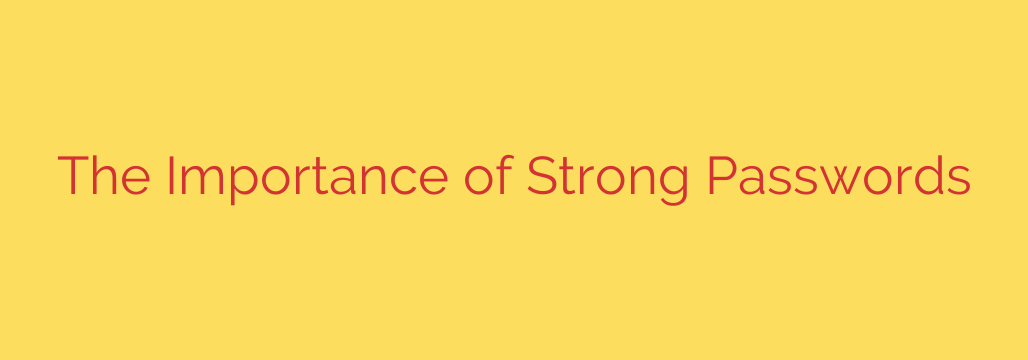
Protect Your Digital Life: The Ultimate Guide to Strong Passwords
In our increasingly digital world, your online accounts are treasure troves of personal information, financial data, and private communications. The primary gatekeeper to this sensitive data is often something deceptively simple: a password. While we all know we should use strong passwords, many of us fall into dangerous habits that leave our digital front doors wide open for intruders.
Think of your password as the key to your digital home. A weak, common, or reused password is like leaving that key under the doormat. It’s the first place a burglar will look. This guide will walk you through why password security is non-negotiable and how to create and manage powerful passwords that protect your most valuable information.
What Makes a Password Weak? The Hacker’s Playbook
To build strong defenses, you first need to understand the attacker’s methods. Cybercriminals don’t typically guess your password by hand. They use sophisticated software that can try billions of combinations in seconds. These attacks often exploit common human tendencies.
A password is considered weak if it includes:
- Common words or phrases: Passwords like “password,” “123456,” or “qwerty” are among the first to be tested in an attack.
- Personal information: Using your name, your pet’s name, your birthday, or your anniversary makes your password predictable. Never use easily guessable information related to your life.
- Simple substitutions: Swapping an “a” for an “@” or an “i” for a “1” (e.g., “P@ssword1”) is a trick that hacking software has long since figured out.
- Short length: A password with fewer than eight characters can often be cracked almost instantly by modern computers.
Falling into any of these traps puts your accounts at immediate risk, especially during a data breach when hackers gain access to lists of usernames and encrypted passwords.
The Anatomy of a Truly Strong Password
A strong password creates a significant barrier for attackers. It’s not about being clever; it’s about being mathematically difficult to guess. The best passwords combine length, complexity, and uniqueness.
Length is King: The single most important factor in password strength is its length. Each additional character exponentially increases the number of possible combinations an attacker would have to test. Aim for a minimum of 12-16 characters, but longer is always better.
Complexity is Queen: A strong password should be a random mix of character types. Include a combination of uppercase letters, lowercase letters, numbers, and symbols (e.g., !, @, #, $, %). This drastically expands the pool of possibilities, making brute-force attacks much harder.
Uniqueness is the Kingdom: This is a golden rule of cybersecurity. Never, ever reuse passwords across multiple websites. If one site is breached and your password is stolen, criminals will use that same email and password combination to try to access your other accounts, including your email, banking, and social media.
A Smarter Method: Creating Memorable Passphrases
Remembering J%7n$p!2*zQ9 is nearly impossible. Fortunately, there’s a better way that is both more secure and easier to remember: the passphrase.
A passphrase is a sequence of random, unconnected words strung together. For example: Correct-Horse-Battery-Staple.
This method is highly effective because it’s extremely long, making it resistant to brute-force attacks. Yet, because it uses real words, it’s far easier for a human to memorize than a random string of characters. A long, four-word passphrase is often stronger and more memorable than a short, complex password.
Your Most Powerful Allies: Password Managers and MFA
Managing dozens of unique, strong passwords for every online account is an impossible task for the human brain. This is where technology becomes your greatest asset.
Password Managers: A password manager is an encrypted digital vault that securely stores all your login credentials. You only need to remember one strong master password to unlock the vault. The manager can then generate and auto-fill incredibly complex, unique passwords for every site you use. This is arguably the single most important step you can take to upgrade your online security.
Multi-Factor Authentication (MFA): Also known as two-factor authentication (2FA), MFA adds a crucial second layer of security. Even if a hacker steals your password, they still can’t access your account without a second piece of information—typically a code sent to your phone or generated by an authenticator app. You should enable MFA on every account that offers it, especially for sensitive services like email, banking, and social media.
What to Do If You Suspect a Breach
If you receive a notification about a data breach or suspect an account has been compromised, act quickly and methodically.
- Change the password for the affected account immediately. Make it a long, unique, and strong passphrase.
- If you reused that password anywhere else, change it on all those accounts, too. Prioritize your most critical accounts, like your primary email.
- Enable Multi-Factor Authentication (MFA) on the account if you haven’t already.
- Review your account for any suspicious activity, such as unrecognized logins or changes to your personal information.
Your digital security is not a one-time setup; it’s an ongoing practice. By moving away from weak, reused passwords and embracing tools like password managers and MFA, you can build a formidable defense that keeps your personal information safe and secure.
Source: https://kifarunix.com/why-creating-a-secure-password-is-crucial/








